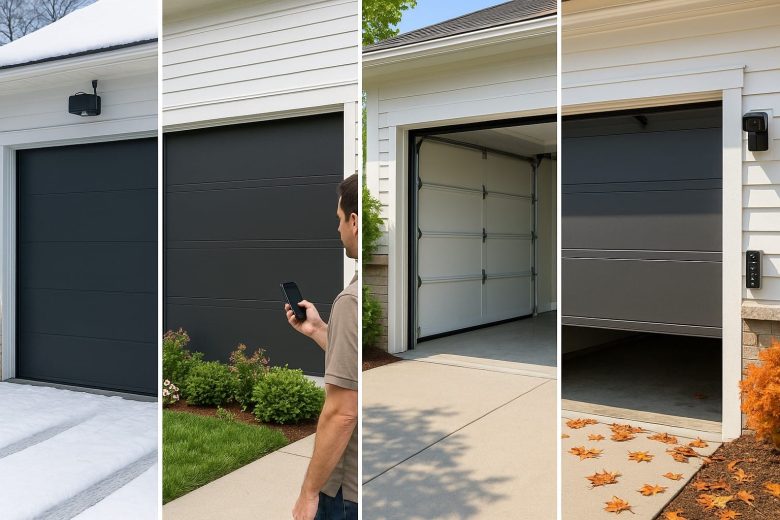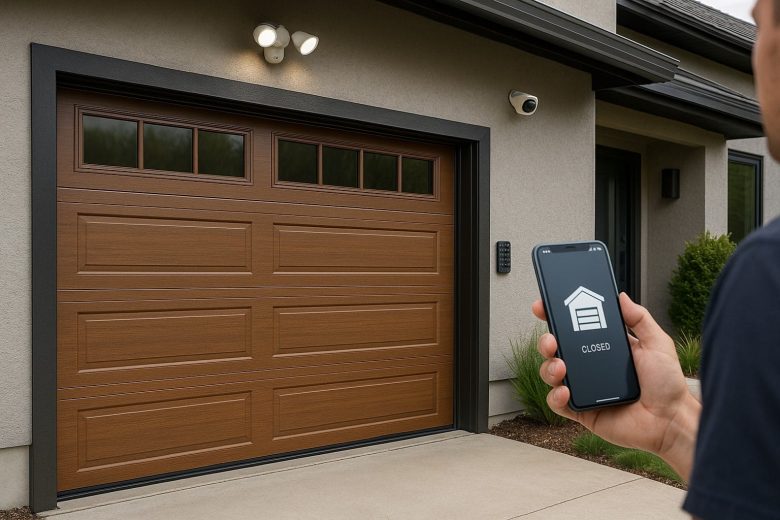Seasonal Guide to New Garage Door Installation for Homeowners

Installing a new garage door is more than just a simple upgrade to your home; it’s a major project that affects energy efficiency, security, and curb appeal. At Colony Garage Doors, we’ve helped countless homeowners throughout Sugar Land, TX, tackle worn-out, damaged, or outdated garage doors with high-quality replacements designed to suit both residential and commercial properties. One recent customer told us their old garage door, which lacked proper insulation and had a bent track, caused monthly energy costs to spike every summer. Once we installed an insulated steel garage door with upgraded safety sensors and smart opener features, their garage transformed into a much more efficient and secure space.
Did you know that a garage door can make up to 30% of a home’s front exterior? That’s a huge chunk of your home’s curb appeal. According to national real estate studies, replacing your old garage door with a new one has one of the highest returns on investment among home improvement projects. Plus, newer models feature improved insulation, upgraded safety sensors, and advanced opener systems that provide remote access, better security, and reduced energy consumption.
Timing your garage door installation is also essential. Depending on the season, various factors such as temperature, humidity, and weather conditions can impact the installation process, material selection, and long-term performance. This comprehensive guide explores the best times of year to install your garage door, what to expect during each season, and how Colony Garage Doors can help you make the right decision for your home.
Why Timing Matters for Garage Door Installation
Garage door installation isn’t just about picking the right door panels or decorative hardware. The installation process itself is affected by seasonal variables. From expansion and contraction of materials to potential scheduling delays due to weather, understanding the seasonal impact is key to ensuring smooth operation and long-term durability.
During summer, high temperatures can cause metal doors and tracks to expand, potentially leading to alignment issues if not installed correctly. In winter, materials like vinyl or rubber used in weather stripping can become brittle, affecting the sealing of the garage. The insulation properties of the garage door also vary in performance depending on temperature fluctuations, directly impacting your home’s energy efficiency.

Professional installers, like our experienced team at Colony Garage Doors, take these variables into account. Whether you’re dealing with a warped door frame, a broken torsion spring, or an outdated garage door opener, our step-by-step guide to the installation process ensures safety, accuracy, and aesthetic appeal.
Spring: The Best Season for New Garage Door Installation
Spring is widely regarded as the best time for new garage door installation. Temperatures in Sugar Land, TX are moderate, making materials easier to handle and less prone to expansion or brittleness. This season is also a time when homeowners tackle spring-cleaning projects, making it ideal to include a garage door upgrade in your list of home improvements.
Replacing an old garage door in spring prepares your home for the upcoming summer heat. An insulated garage door with a high R-value can help conserve energy, reduce cooling costs, and maintain more comfortable temperatures inside your garage. Plus, spring is often when manufacturers and dealers, including Colony Garage Doors, offer seasonal promotions on installation and labor costs.
From choosing the right garage door style such as a roll up door or carriage-style doors to selecting hardware like decorative hinges or a screw drive carriage, spring allows ample time to plan and install the perfect new door for your house. Our installation team handles everything from removing the old door to making final adjustments for safe operation.
Summer: Focus on Efficiency and Upgrades
Summer brings intense heat, especially in places like Sugar Land, where garage temperatures can exceed 100°F. For homeowners with an attached garage, this can lead to higher energy consumption and discomfort. Installing an insulated garage door during summer helps combat these issues by maintaining cooler garage interiors and reducing overall energy use.
However, summer installations come with challenges. Materials like metal and rubber expand under high heat, so our installers at Colony Garage Doors use specific techniques and tools to ensure proper track alignment and weather sealing. Adhesives used for bottom panels and insulation layers must be temperature-resistant to prevent warping or separation.
Upgrading your garage door opener in summer is also popular. Smart openers with remote access, safety features, and backup battery systems are particularly useful during power outages. Whether you’re installing a Stanley garage door system or a LiftMaster opener, our guide ensures all steps from motor placement to drive carriage testing are executed with precision.
Fall: Winter Prep and Energy Efficiency
Fall is the season to prepare your home for colder temperatures. For garage doors, this means upgrading to models with enhanced insulation, weather stripping, and energy-efficient features. Fall installations ensure that your garage maintains consistent temperatures, reducing heating costs and protecting stored items.
Our team at Colony Garage Doors recommends doors with high R-values and reinforced bottom panels for maximum thermal protection. This is especially important if your garage doubles as a workspace, utility room, or entryway into the home. Choosing steel doors with polyurethane foam cores provides both insulation and strength.
Fall is also an ideal time for door frame repairs, opener replacements, and track maintenance. Our installers check for issues like worn-out springs, misaligned tracks, and outdated safety sensors. With demand slightly lower than in spring and summer, fall offers more flexibility for scheduling and possible cost savings on installation.
Winter: Emergency Repairs and Insulated Solutions
While winter isn’t the preferred time for garage door installation, emergencies do happen. Cold weather can cause brittle springs, frozen tracks, or doors that won’t seal properly. In such cases, Colony Garage Doors offers 24/7 emergency service and same-day installation to ensure your home remains safe and secure.
For winter installations, we use cold-resistant lubricants, rubber seals, and weatherproof materials. Our team is trained to handle ice and rain during the installation process, taking extra steps to ensure a safe worksite. We also recommend smart openers with power backup to keep your garage functional during winter storms.
Insulated garage doors are a must during the colder months. High-density panels, energy-efficient hardware, and reinforced hinges contribute to safe operation and reduced energy consumption. Our detailed, step-by-step guide to winter installations covers every factor, from hardware choice to final alignment checks.
Materials Matter: Choosing the Right Garage Door
Selecting the right materials for your garage door is crucial for performance, longevity, and seasonal durability. Each material has its strengths and is suited for specific climates and homeowner preferences:
- Steel: Durable, secure, and compatible with insulation. Ideal for year-round performance.
- Wood: Beautiful and traditional, but requires regular maintenance and may warp in humid climates.
- Aluminum: Lightweight and rust-resistant, but less insulating.
- Fiberglass: Resistant to salt air and mimics wood, but may fade or crack over time.
- Vinyl: Low-maintenance and dent-resistant, though not ideal for extreme cold.
Our design consultants help you choose the right door style, color, panel type, and insulation level to suit your home’s design and energy efficiency needs.
Springs, Tracks, and Hardware: Don’t Overlook the Details
Behind every smooth-operating garage door is a system of springs, tracks, and hardware that requires precise installation and periodic maintenance. Torsion springs provide balance and counterweight for heavy doors, while extension springs stretch and contract with door movement.
Faulty springs can cause safety issues or uneven door motion. Our installation team ensures proper spring calibration, alignment of horizontal and vertical tracks, and secure fastening of all hardware. We use high-gauge steel tracks, weather-resistant fasteners, and commercial-grade rollers for a longer lifespan and better operation.
Maintenance tips include lubricating moving parts, checking for wear on cables and hinges, and scheduling annual inspections. Colony Garage Doors offers maintenance plans to help you stay on track year-round.
Energy Efficiency and Insulation Ratings
A well-insulated garage door saves energy and protects your home from temperature extremes. Insulation not only helps conserve energy but also improves soundproofing and increases door strength.
The most common types of insulation include:
- Polystyrene: Affordable, rigid panels, good for moderate insulation needs.
- Polyurethane: High-performance foam sprayed into door panels, providing superior R-value.
Look for garage doors with R-values of 10 or higher for optimal performance in Sugar Land’s climate. Our team also ensures that weather seals, bottom panels, and door frames are properly fitted to avoid air leaks.
Smart Features and Safety Enhancements
Today’s garage doors offer more than just open and close functionality. Smart garage door openers allow remote access through smartphones, scheduling, and real-time alerts. Integration with home systems like Alexa or Google Assistant provides added convenience.
Safety features include:
- Infrared safety sensors that reverse the door if something is in its path.
- Pinch-resistant panels to protect fingers.
- Tamper-proof brackets to prevent forced entry.

Colony Garage Doors installs LiftMaster, Genie, and Chamberlain openers with advanced features, ensuring your system is both modern and secure.
Permits, HOA Requirements, and Compliance in Sugar Land, TX
Installing a garage door isn’t just about aesthetics; it also involves adhering to local codes and regulations. Colony Garage Doors handles all permit applications, HOA approvals, and inspections for your convenience.
Our doors meet Texas Windstorm Certification requirements and follow International Building Code standards for safety and performance. From hurricane-rated panels to fire-resistant insulation materials, we ensure compliance for both residential and commercial garage door projects.
Understanding the Costs and Value
The cost of a new garage door installation depends on several factors:
- Door type and materials
- Insulation level and energy efficiency
- Opener model and smart features
- Labor costs and customization
While basic models start around $700, high-end custom doors can exceed $2,500. We provide free estimates, competitive pricing, and financing options for all homeowners. Our goal is to offer cost-effective solutions that deliver maximum return on investment.
How Can Colony Garage Doors Help You?
Choosing the right garage door installation team can be the difference between a smooth project and recurring headaches. At Colony Garage Doors, we take pride in offering personalized service, top-quality products, and reliable installations tailored to your seasonal needs.
Whether you’re replacing an old garage door with damaged panels or planning a stylish new garage door with smart features and advanced insulation, we’re here to help. Our trained technicians handle every detail, from selecting materials and securing permits to installing openers and performing final safety checks.
Address: Southwest Fwy Unit A, Sugar Land, TX 77479
Phone: (832) 345-9267
Let our experienced installation team help you find the right garage door at the right time, with the right features, ensuring safe operation, curb appeal, and energy efficiency for your home.
Frequently Asked Questions (FAQs)
1. How long does a garage door installation typically take?
Most standard garage door installations take between 3 to 6 hours, depending on the door type, opener system, and any custom features.
2. Can I install a garage door by myself to save money?
While DIY installation is possible, it’s not recommended due to the risks involved with springs, alignment, and heavy panels—professional installation ensures safety and proper functionality.
3. How often should garage door springs be replaced?
Garage door springs typically last 7 to 9 years with regular use, but frequent opening and closing may reduce their lifespan to 4–6 years.
4. What maintenance does a garage door need after installation?
Perform seasonal lubrication of moving parts, visual inspections of tracks and hardware, and test safety sensors monthly to ensure proper operation and longevity.
